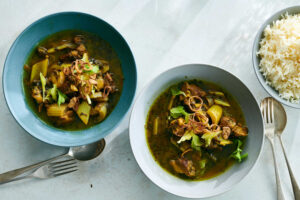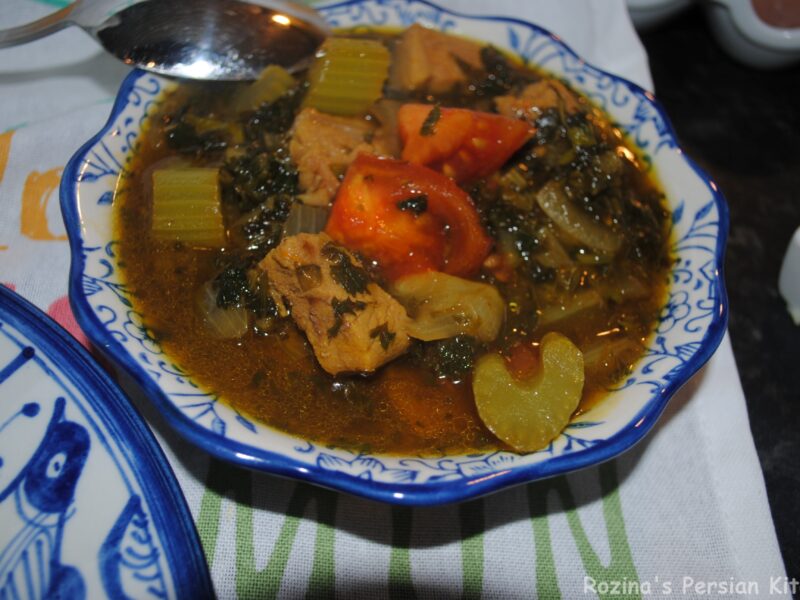Soup Al-Khoresh, a beloved staple of Libyan cuisine, embodies the essence of warmth, comfort, and nourishment. This hearty soup, crafted from a harmonious blend of lamb or chicken, lentils, vegetables, and spices, offers a symphony of flavours and textures that soothe the senses and invigorate the soul.
In this exploration, we delve into the rich history, cultural significance, ingredients, preparation methods, and gastronomic allure of Soup Al-Khoresh, unravelling the secrets behind its enduring popularity and universal appeal.
A Brief History
Soup Al-Khoresh has deep roots in Libyan culinary tradition, dating back generations to a time when simple yet flavorful dishes sustained families through the harsh realities of desert life. Born out of necessity, this hearty soup was crafted from humble ingredients readily available in the region, such as lamb or chicken, lentils, and seasonal vegetables.
Over the centuries, Soup Al-Khoresh evolved from a basic sustenance food to a cherished comfort dish, celebrated for its ability to nourish the body and uplift the spirit. It became a symbol of hospitality, generosity, and communal gathering, as families and friends gathered around steaming bowls of Soup Al-Khoresh to share stories, laughter, and love.
The Ingredients
- Meat: The heart of Soup Al-Khoresh lies in tender cuts of lamb or chicken, which impart rich, savoury flavours and succulent textures to the broth.
- Lentils: Nutrient-dense lentils add depth and substance to the soup, providing protein, fibre, and essential vitamins and minerals.
- Vegetables: A medley of vegetables, such as onions, carrots, celery, and tomatoes, contribute sweetness, colour, and nutrients to the soup, enhancing its overall flavour and nutritional profile.
- Spices: Aromatic spices, including cumin, coriander, turmeric, cinnamon, and paprika, infuse Soup Al-Khoresh with warmth, complexity, and depth of flavour, transporting diners to distant lands with each spoonful.
- Broth: A flavorful broth, typically made from water or stock, serves as the foundation of Soup Al-Khoresh, providing a rich and savoury base for the ingredients to meld and simmer together.
Culinary Preparation
The preparation of Soup Al-Khoresh is a labour of love that requires patience, attention to detail, and a mastery of culinary techniques. Here’s a step-by-step guide to crafting the perfect Soup Al-Khoresh:

- Prepare the Meat: Begin by trimming excess fat from the lamb or chicken and cutting it into bite-sized pieces. Season with salt, pepper, and your choice of spices, then brown the meat in a large soup pot until golden and caramelized.
- Saute the Aromatics: Add chopped onions, carrots, celery, and garlic to the pot, sautéing until softened and fragrant. This aromatic base forms the flavour foundation of the soup, infusing it with depth and complexity.
- Simmer with Lentils: Stir in rinsed lentils and diced tomatoes, then pour in enough broth to cover the ingredients. Bring the mixture to a boil, then reduce the heat to low and simmer gently until the lentils are tender and the flavours have melded together beautifully.
- Season to Taste: Taste the soup and adjust the seasoning as needed, adding more salt, pepper, or spices to achieve the desired flavour profile. You can also add a squeeze of lemon juice or a splash of vinegar to brighten the flavours.
- Serve and Enjoy: Ladle the piping hot Soup Al-Khoresh into bowls, garnishing with chopped fresh herbs, such as parsley or cilantro, for a pop of colour and freshness. Serve with crusty bread or fluffy couscous for a satisfying and nourishing meal.
Cultural Significance
Soup Al-Khoresh holds profound cultural significance in Libyan society, where it is revered as a symbol of hospitality, generosity, and the spirit of sharing. It is often prepared and shared during festive occasions, religious celebrations, and family gatherings, where it serves as a centrepiece of the meal and a source of comfort and nourishment for all who partake.
In Libyan culture, Soup Al-Khoresh is more than just a dish; it is a reflection of the values and traditions that unite families and communities. Its preparation and consumption are steeped in ritual and symbolism, symbolizing the bonds of kinship, the importance of communal solidarity, and the resilience of the human spirit in the face of adversity.
Health Benefits
Despite its rich and hearty nature, Soup Al-Khoresh offers a range of health benefits, thanks to its wholesome ingredients and balanced preparation:
- Protein-Rich: The meat and lentils in Soup Al-Khoresh provide a significant source of protein, essential for muscle growth, repair, and overall health.
- Fibre-Packed: Lentils are high in dietary fibre, which promotes digestive health, regulates blood sugar levels, and helps maintain a healthy weight.
- Nutrient-Dense: The vegetables in Soup Al-Khoresh, such as carrots, celery, and tomatoes, are rich in vitamins, minerals, and antioxidants, which support overall health and well-being.
- Hydrating: The broth base of Soup Al-Khoresh provides hydration and helps replenish fluids, making it an excellent choice for staying hydrated, especially during colder months.
- Immune-Boosting: The aromatic spices and herbs in Soup Al-Khoresh, such as garlic, cumin, and coriander, have antimicrobial and anti-inflammatory properties that support immune function and promote overall wellness.
In conclusion, Soup Al-Khoresh stands as a testament to the culinary ingenuity, cultural heritage, and communal spirit of Libyan cuisine. Its rich flavours, wholesome ingredients, and nourishing properties make it a beloved comfort food that transcends borders and
Related Tags
Taiwo Olawuyi
Taiwo Olawuyi is a highly dedicated and passionate professional blogger, renowned for her ability to create captivating, informative, and engaging content in the realm of health and wellness. She holds a Bachelor's degree in Political Science from Olabisi Onabanjo University and a Master's degree in Adult Education from the prestigious University of Ibadan. Her profound passion for health and wellness, coupled with her unwavering dedication to her audience, serves as a constant source of inspiration and enlightenment for readers worldwide.










